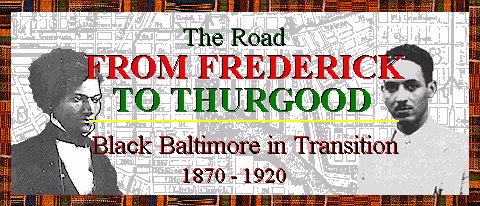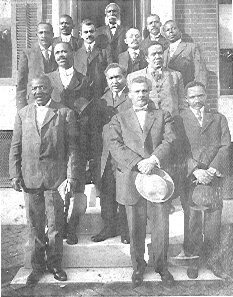 |
"A Long, Full, Big Life":Johnson's Political Activism |
 |
"A Long, Full, Big Life":Johnson's Political Activism |
He conceived the idea then, what so many of our modern leaders are just discovering, that the courts of law are very largely the final arbiters of our rights- A. B. Koger on Harvey Johnson, 1957 |
With his Union Baptist house in order, Harvey Johnson turned his attention
and leadership to the secular world. By the early 1880s, Johnson began
to lend his reputation, his pulpit, and his finances to a burgeoning "race"
effort among black leaders nationally. As Reconstruction progress and
civil right protections began to surrender to the wave of "redemption"
sweeping the  South,
blacks took their cause to the courts. Despite setbacks and unfavorable
interpretations of the Fourteenth Amendment, blacks in Baltimore saw the
judiciary as the ultimate insurer of rights. On June 22, 1885, Rev. Dr.
Harvey Johnson called five of his closest Baptist colleagues to his home
at 775 W. Lexington St. In attendance were the reverends J.C. Allen of
First Baptist Church, P.H.A. Braxton of Calvary Baptist, William
M. Alexander of Sharon Baptist, and W.C. Lawson of Macedonia Baptist
Church. At this meeting, the discussion focused on the erosion of Reconstruction Era
progress and what they as Baptists, as pastors, and as black men could
do about the problem. The result of this meeting of minds was the formation
of a civil rights organization, the Mutual United Brotherhood of Liberty
of the United States of America (MUBL). The MUBL pledged themselves, "to
use all legal means within our power to procure and maintain our rights
as citizens of this our common country." The organization established
offices at 2 E. Saratoga St. In mid-October 1885, the MUBL held a three-day
conference on the status of black civil rights. Frederick Douglass addressed
the conference. Immediately prior to the convening of this conference,
probably due to no small coincidence, Johnson and the MUBL successfully
engineered the admittance of Everett J. Waring
to the Maryland Bar, concluding a fight begun by others in the 1870s. With
the bar door opened, Johnson, the MUBL, and the small but growing coterie
of black lawyers began an attack on inequalities. Black exclusion from jury
boxes, the absence of black teachers from the city's public schools, the
deteriorated condition of black public schools, and the infamous bastardy
codes effecting black women, were the more visible of the fights taken
on by the MUBL legal team.
South,
blacks took their cause to the courts. Despite setbacks and unfavorable
interpretations of the Fourteenth Amendment, blacks in Baltimore saw the
judiciary as the ultimate insurer of rights. On June 22, 1885, Rev. Dr.
Harvey Johnson called five of his closest Baptist colleagues to his home
at 775 W. Lexington St. In attendance were the reverends J.C. Allen of
First Baptist Church, P.H.A. Braxton of Calvary Baptist, William
M. Alexander of Sharon Baptist, and W.C. Lawson of Macedonia Baptist
Church. At this meeting, the discussion focused on the erosion of Reconstruction Era
progress and what they as Baptists, as pastors, and as black men could
do about the problem. The result of this meeting of minds was the formation
of a civil rights organization, the Mutual United Brotherhood of Liberty
of the United States of America (MUBL). The MUBL pledged themselves, "to
use all legal means within our power to procure and maintain our rights
as citizens of this our common country." The organization established
offices at 2 E. Saratoga St. In mid-October 1885, the MUBL held a three-day
conference on the status of black civil rights. Frederick Douglass addressed
the conference. Immediately prior to the convening of this conference,
probably due to no small coincidence, Johnson and the MUBL successfully
engineered the admittance of Everett J. Waring
to the Maryland Bar, concluding a fight begun by others in the 1870s. With
the bar door opened, Johnson, the MUBL, and the small but growing coterie
of black lawyers began an attack on inequalities. Black exclusion from jury
boxes, the absence of black teachers from the city's public schools, the
deteriorated condition of black public schools, and the infamous bastardy
codes effecting black women, were the more visible of the fights taken
on by the MUBL legal team.
In line with the philosophy of self-determination and separatism which saw him push toward the founding of the Colored Baptist Convention of Maryland (1898), Harvey Johnson developed a plan for race progress known as the "Texas Purchase Movement." The result of confidence, pride, and frustration, Johnson called for the separation of the races of the U.S. with blacks removing themselves to an independent state, formerly Texas. Clearly these approaches to the problem of race discrimination moved away from that designated by the "old guard" of the post-Civl War Era.
|
Tell Us What You Think About the Maryland State Archives Website!
|
© Copyright December 02, 1998 Maryland State Archives